RocketReach Alternatives
Considering a switch from RocketReach? We compare 10 leading alternatives on data, features, and pricing to inform your decision.

RocketReach is a popular tool, and you may have used it for good reasons. It performs well when you need to find a large volume of contacts. Its extensive database helps many teams connect with leads and build outreach campaigns.
But like any tool, it has limits. Some users note occasional data inaccuracies or find the interface a bit dated. We've analyzed the top alternatives against RocketReach, using G2 reviews, to help you shortlist your best options. Let's get started.
Consider 11x for Your Sales Team
If your team explores sales automation, consider 11x. It provides digital workers to handle prospect research and initial outreach. This lets your sales representatives focus on deal closure and can help scale your operations.
We offer a GTM platform where AI agents manage your sales process. 11x uses Alice to find prospects, run outreach, and update your CRM. Julian qualifies inbound leads and books meetings.
Our platform unifies data enrichment, outreach, and email warmup. This approach means you do not need separate point solutions, which can simplify your GTM stack.
RocketReach Alternatives
This section provides a detailed breakdown of leading RocketReach alternatives. Each review covers pricing, core features, and how the tool stacks up against RocketReach in terms of benefits and potential drawbacks.
1) ZoomInfo
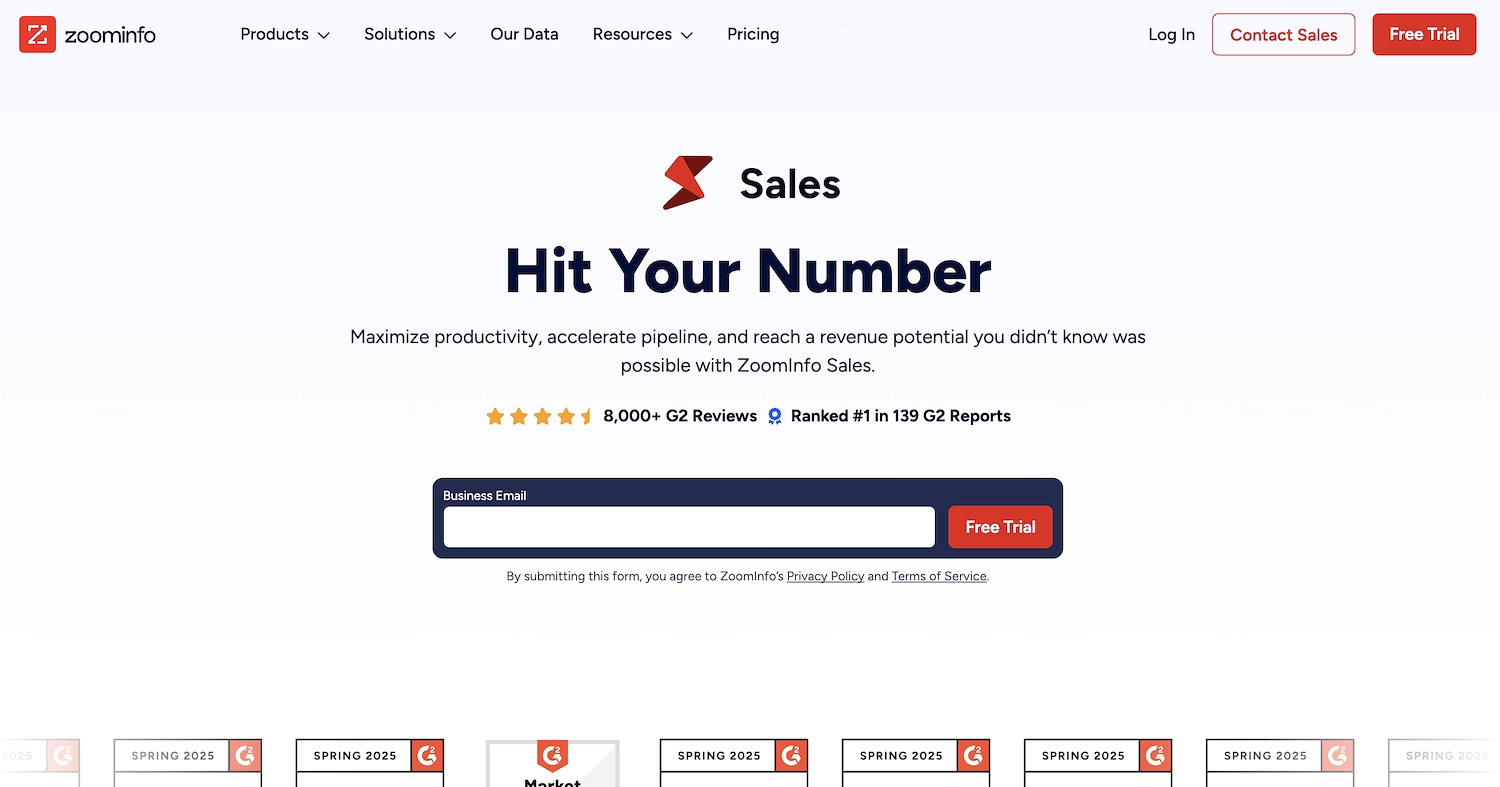
ZoomInfo is a go-to-market intelligence platform. It offers an AI-powered B2B data system to help companies identify and connect with buyers. The platform provides verified contact and company data, along with real-time buyer-intent signals and automation tools.
Teams use it to prospect, build lead lists with verified contact information, and automate outreach. It aims to be a single source of truth that unifies sales, marketing, and operations departments.
ZoomInfo's Main Features
- Offers a generative-AI assistant, Copilot, that automates repetitive tasks and suggests the next best actions.
- Provides buyer intent data and tracks anonymous website visitors to identify active buyers.
- Includes engagement tools for sales automation, conversation intelligence, and website chat optimization.
- Delivers orchestration features like workflow automation, CRM enrichment, and predictive modeling for ideal customer profiles.
How ZoomInfo Compares to RocketReach
Average Review score: 4.5/5 stars based on 8,738 G2 reviews.
- ZoomInfo offers an AI assistant, Copilot, that gives guided recommendations. This differs from RocketReach, which focuses on contact data retrieval.
- The platform provides buyer intent data to help teams find active buyers. This is a more advanced feature compared to the contact lookup functions of RocketReach.
- It includes sales engagement and conversation intelligence tools. This allows for a more integrated workflow than RocketReach, which requires separate outreach tools.
- A frequently refreshed database helps maintain high data accuracy. This is a notable difference from RocketReach, where users sometimes find outdated contact details.
- Data orchestration features automate CRM enrichment and workflows. This offers a more advanced integration compared to the data export options in RocketReach.
Where ZoomInfo May Not Be The Best Fit
- ZoomInfo's pricing is typically based on annual contracts, which might not suit teams with smaller budgets. In contrast, RocketReach provides more flexible options for users who only need occasional access to contact data.
- It is a complex platform with many features, so it can take time to learn. For teams that just need to find contact information quickly, RocketReach offers a more straightforward experience.
- While its database is large, some users find it has fewer contacts in niche industries. RocketReach's different data sources might occasionally fill these specific gaps better.
Pricing and Cost-Effectiveness
ZoomInfo does not list its prices publicly, offering custom quotes instead. This model is typical for enterprise-grade platforms and generally indicates a higher price point. For the most accurate pricing, we recommend requesting a quote on the company's official website.
2) Apollo.io
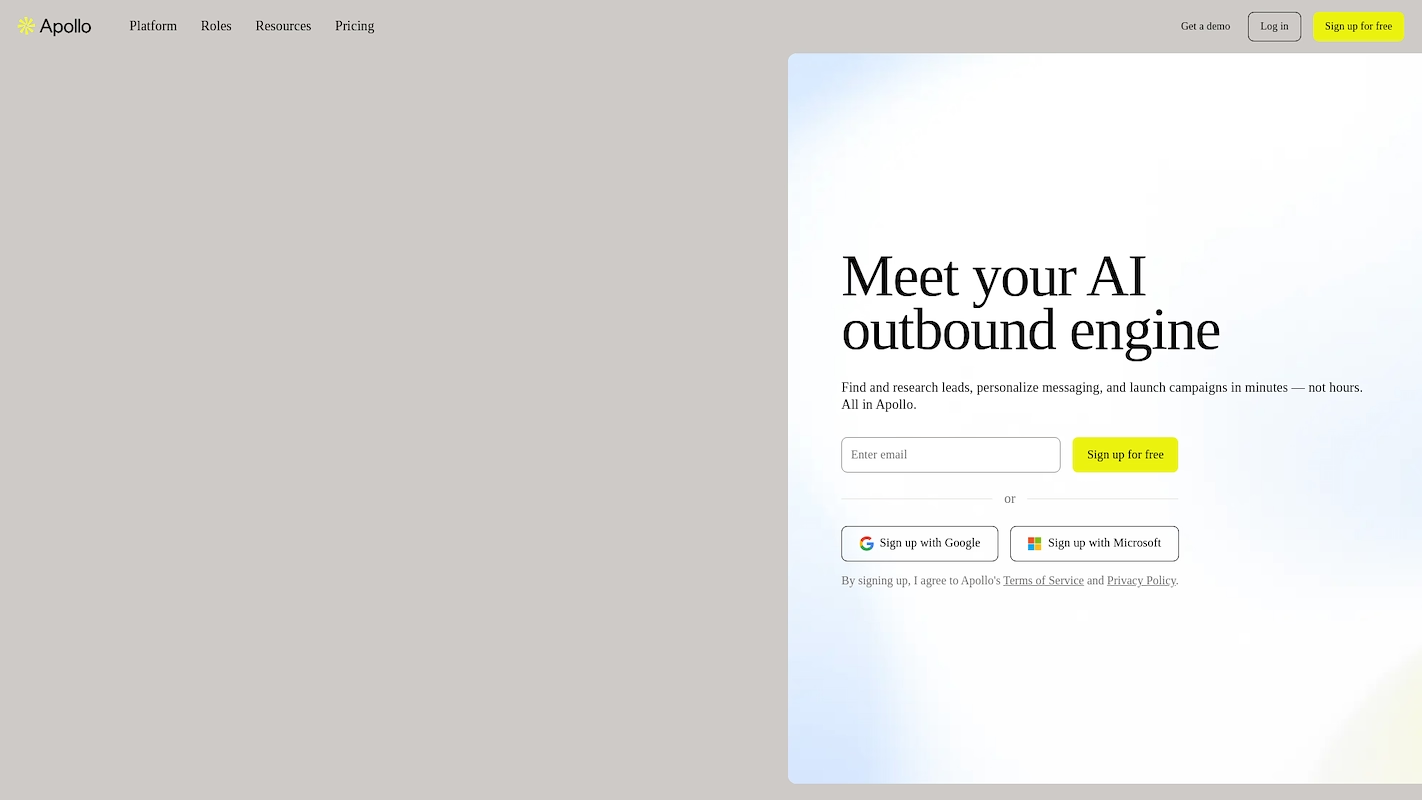
Apollo.io is a sales intelligence and engagement platform. It provides access to a large B2B contact database that sales teams use to find prospects and verify contact details.
The platform also includes tools to automate outreach sequences. This combination of data and engagement features supports the full sales process.
Apollo.io's Main Features
- Provides access to a large B2B database to find prospects and verify contact details.
- Includes tools to automate sales outreach sequences.
- Combines a contact database with engagement features to support the full sales process.
How Apollo.io Compares to RocketReach
Average Review score: 4.7/5 stars based on 8,904 G2 reviews.
- Apollo.io combines contact data with a sales engagement suite. This differs from RocketReach, which focuses on data retrieval and requires separate tools for outreach.
- It offers a free plan and transparent monthly pricing options. This provides more flexibility for smaller teams than some of RocketReach's plans that are geared toward high-volume use.
- The platform includes an AI intelligence engine that gives recommendations. This feature adds a layer of analytics not found in RocketReach, which centers on contact discovery.
- With a database of over 210 million contacts, it provides data on a large scale similar to RocketReach. However, Apollo.io integrates this data directly with its own outreach automation tools.
Where Apollo.io May Not Be The Best Fit
- Apollo.io combines many tools, which can make it complex to learn. In comparison, RocketReach is simpler for teams that only need to find contact information quickly.
- Some users report that its contact data can occasionally be inaccurate. For certain niche roles, RocketReach's specialized database might offer more dependable results.
- Its all-in-one model means you might pay for sales tools you do not use. RocketReach can be a more budget-friendly choice if you only need data and have other tools for outreach.
Pricing and Cost-Effectiveness
Apollo.io offers transparent pricing with a free plan and paid tiers starting at $49 per user monthly. This model provides cost predictability, unlike RocketReach's focus on flexible plans for high-volume data lookups. For the most current information, check the pricing on Apollo.io's official website.
3) Hunter
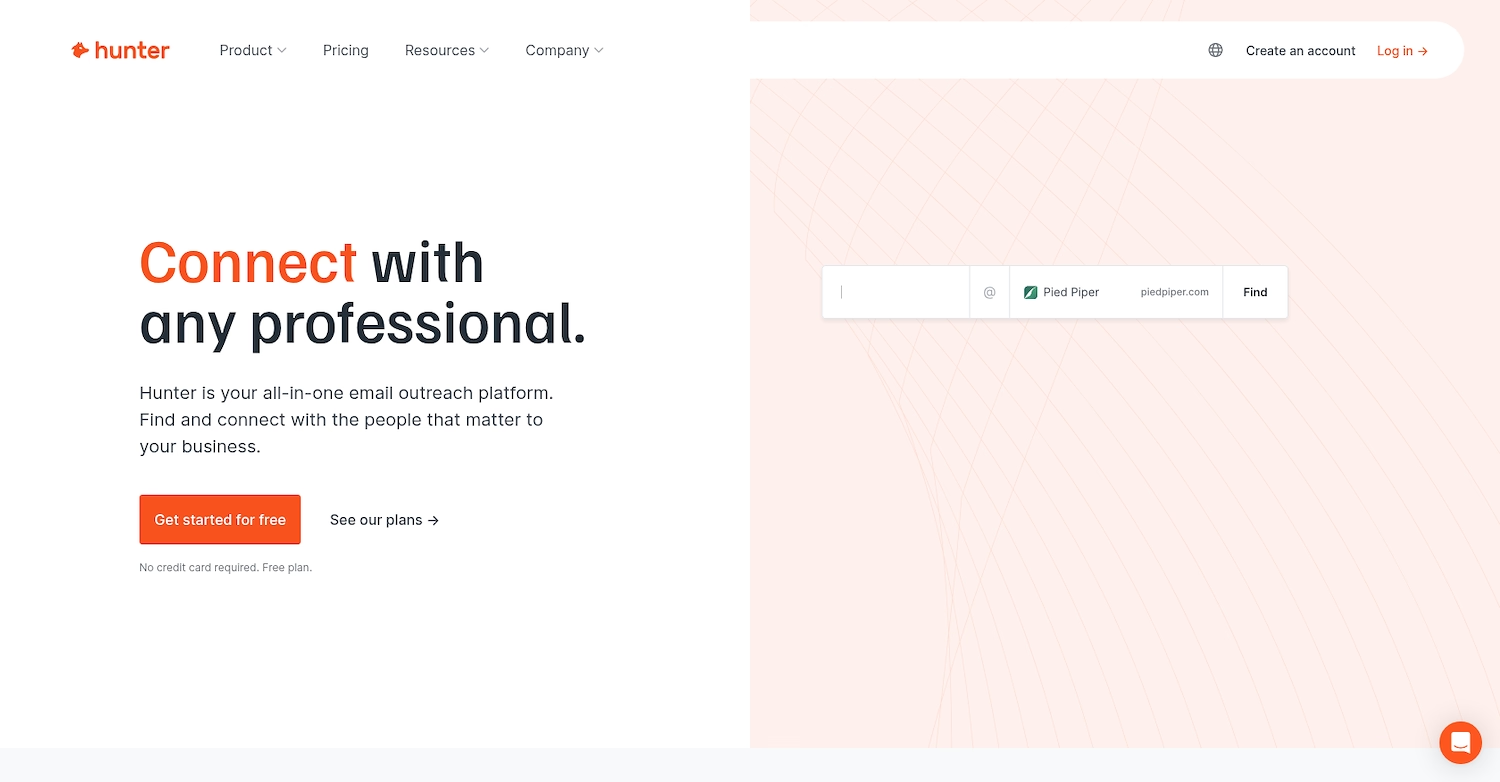
Hunter is an all-in-one platform for email outreach and B2B lead generation. It allows users to discover prospects, find and verify professional email addresses, and run personalized cold-email campaigns from a single workspace. It helps teams build targeted lead lists and automate outreach.
Hunter's Main Features
- Includes a campaign tool to compose, personalize, and track cold-email sequences, which sends natively from a user's Gmail or Outlook account.
- Provides a TechLookup feature that lists web domains based on their technology stack.
- Fetches company-wide contact lists from a single domain or company name using its Domain Search function.
- Contains an email verifier to check deliverability in bulk, which helps reduce bounce rates and protect sender reputation.
How Hunter Compares to RocketReach
Average Review score: 4.4/5 stars based on 592 G2 reviews.
- Hunter includes a built-in tool for cold email campaigns, which is different from RocketReach's focus on contact discovery that requires a separate outreach tool.
- It provides an email verifier to check addresses in bulk, which helps protect your sender reputation. This is a core function, while RocketReach's primary focus is on data lookup.
- The platform offers a TechLookup feature to find leads based on the technology they use. This allows for more targeted prospecting than RocketReach's general contact search.
- Hunter offers a free plan and clear monthly pricing. This provides more cost predictability for smaller teams compared to RocketReach's credit-based system for lookups.
Where Hunter May Not Be The Best Fit
- Hunter's database can be less extensive for niche industries. RocketReach's larger contact volume might offer better results for very specific searches.
- The tool focuses primarily on finding email addresses. In comparison, RocketReach often provides a wider array of data, including direct-dial phone numbers, which Hunter may not have.
- Its integrations are designed around its own campaign tool. Teams with a separate, established sales engagement platform might find RocketReach's data export more adaptable to their workflow.
Pricing and Cost-Effectiveness
Hunter offers a free plan and paid tiers starting at $49 per month, providing predictable costs unlike RocketReach's credit-based system. This makes Hunter more cost-effective for consistent use, while RocketReach may be better for sporadic lookups. For current pricing, visit Hunter's official website.
4) Lusha
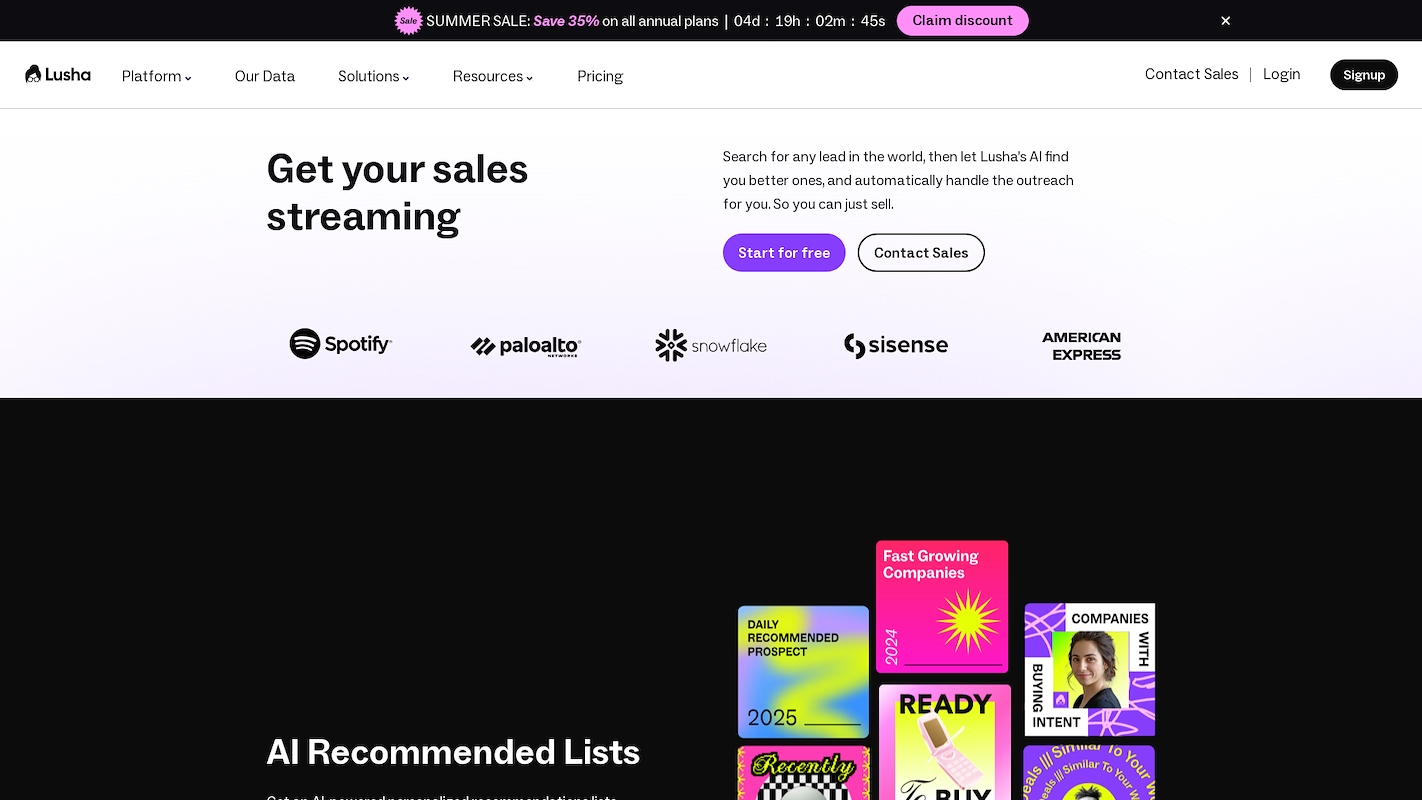
Lusha is a go-to-market intelligence platform. It provides teams with B2B contact and company data. Users can find prospect information, enrich CRM systems, and identify buyer intent signals.
The service offers verified email addresses and direct-dial phone numbers to help connect with contacts. It supports sales, marketing, and recruitment professionals.
Lusha's Main Features
- Delivers AI-recommended lists of companies and decision-makers based on an ideal customer profile.
- Identifies in-market buyers with intent data and provides real-time alerts on buying signals.
- Offers a tool, Lusha Conversations, to record and analyze sales meetings.
- Holds data compliance certifications for GDPR, CCPA, ISO 27701, and ISO 27001.
How Lusha Compares To RocketReach
Average Review score: 4.3/5 stars based on 1,516 G2 reviews.
- Lusha provides AI-powered prospect lists that automatically refresh based on your ideal customer profile. This is a different approach from RocketReach, which focuses on manual contact searches.
- It identifies active buyers through intent data and provides real-time alerts. This offers a proactive element that is not a core feature of RocketReach's contact retrieval service.
- The platform holds specific data compliance certifications like GDPR and ISO 27701. This gives users a clear assurance of its data privacy standards, a detail not typically emphasized by RocketReach.
- Lusha includes a tool to record and analyze sales meetings for coaching. This conversation intelligence feature is outside the scope of RocketReach, which centers on providing contact data.
Where Lusha May Not Be The Best Fit
- Some users report that Lusha's data can be outdated for certain contacts. For very specific or niche roles, RocketReach's database might provide more reliable information.
- Lusha's plans may have credit limits, especially for direct-dial phone numbers. In contrast, RocketReach's model often suits teams that need a large volume of contact data lookups.
- The tool's CRM integration sometimes lacks a full two-way sync. Teams with complex workflows might find RocketReach's data export options more adaptable to their existing systems.
Pricing and Cost-Effectiveness
Lusha offers transparent monthly pricing, with paid plans starting at $36 per user. This model provides predictable costs, differing from RocketReach's credit-based system, which can be better for high-volume, sporadic lookups. For the most current pricing, we recommend visiting Lusha's official website.
5) Clearbit
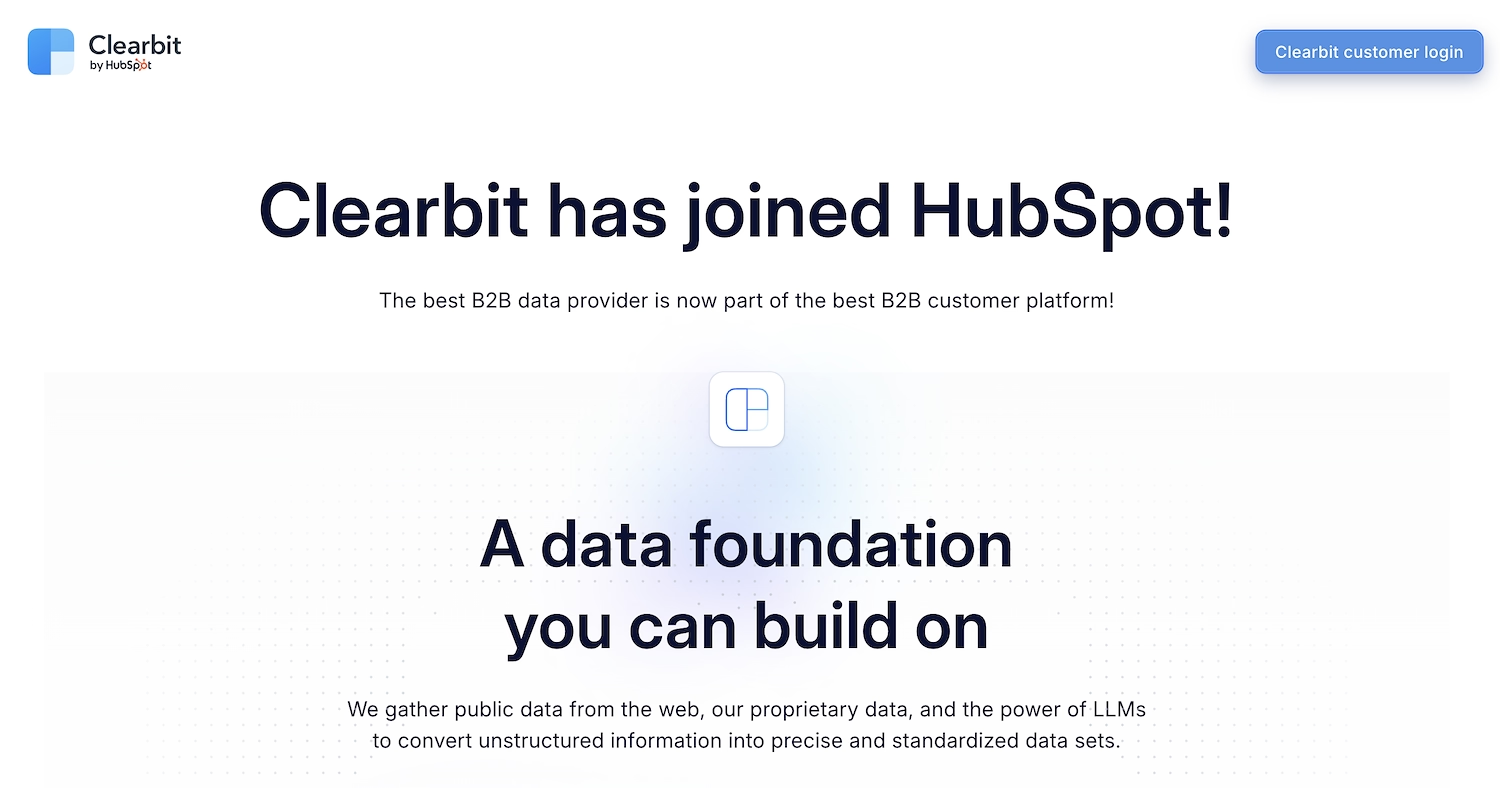
Clearbit is a marketing data platform that helps B2B teams understand their customers. It provides company and contact data to enrich your systems and identify ideal prospects. Businesses use this information to personalize marketing campaigns and sales outreach, which creates a more tailored customer experience.
Clearbit's Main Features
- Aggregates public web data, proprietary sources, and LLM processing to deliver standardized B2B datasets.
- Provides data points for instant lead scoring and routing using deep industry classifications and corporate hierarchy mapping.
- De-anonymizes website traffic to identify visiting companies that match an ideal customer profile.
- Removes form fields that it can enrich automatically, which helps reduce friction and boost conversion rates.
How Clearbit Compares to RocketReach
Average Review score: 4.4/5 stars based on 626 G2 reviews.
- Clearbit identifies anonymous companies that visit your website. This differs from RocketReach, which focuses on searching for known contacts and companies.
- The platform automatically enriches existing leads in your CRM with over 100 data points. This provides a different approach than RocketReach, where you typically export new contact lists.
- It helps shorten website forms by auto-filling information for known visitors. This marketing-focused feature is not part of RocketReach's core contact retrieval function.
- The tool offers deep integrations with platforms like HubSpot to automate lead scoring and routing. This is more integrated for marketing workflows compared to RocketReach's data export capabilities.
Where Clearbit May Not Be The Best Fit
- Clearbit's main function is to enrich existing data. For teams that need to build new contact lists from the ground up, RocketReach's focus on active prospecting might be a more direct fit.
- It sometimes provides less direct-dial phone number coverage compared to RocketReach. For sales teams that rely heavily on cold calling, RocketReach's database might offer more options.
- The tool is built as a comprehensive marketing data platform, which can be more complex than needed. If you only require contact lookups, RocketReach's simpler model can be more straightforward.
Pricing and Cost-Effectiveness
Clearbit uses custom pricing packages tailored for marketing teams, which differs from RocketReach's credit-based system for contact lookups. For the most accurate information, we recommend visiting Clearbit's official website to request a quote.
Try 11x for Sales Automation
If you want to scale sales operations without an increase in headcount, consider 11x. Our digital workers handle prospect research and outreach. This frees up your sales team to focus on deals. Book a demo to see how our AI agents can support your team.
At 11x, we use AI to manage your sales process. Alice finds ideal accounts, enriches contact data, and starts outreach. Julian takes calls, qualifies leads, and books meetings. Our platform combines intent data and email warmup, so you don't need multiple tools.
Book a demo to see how it works.
6) UpLead
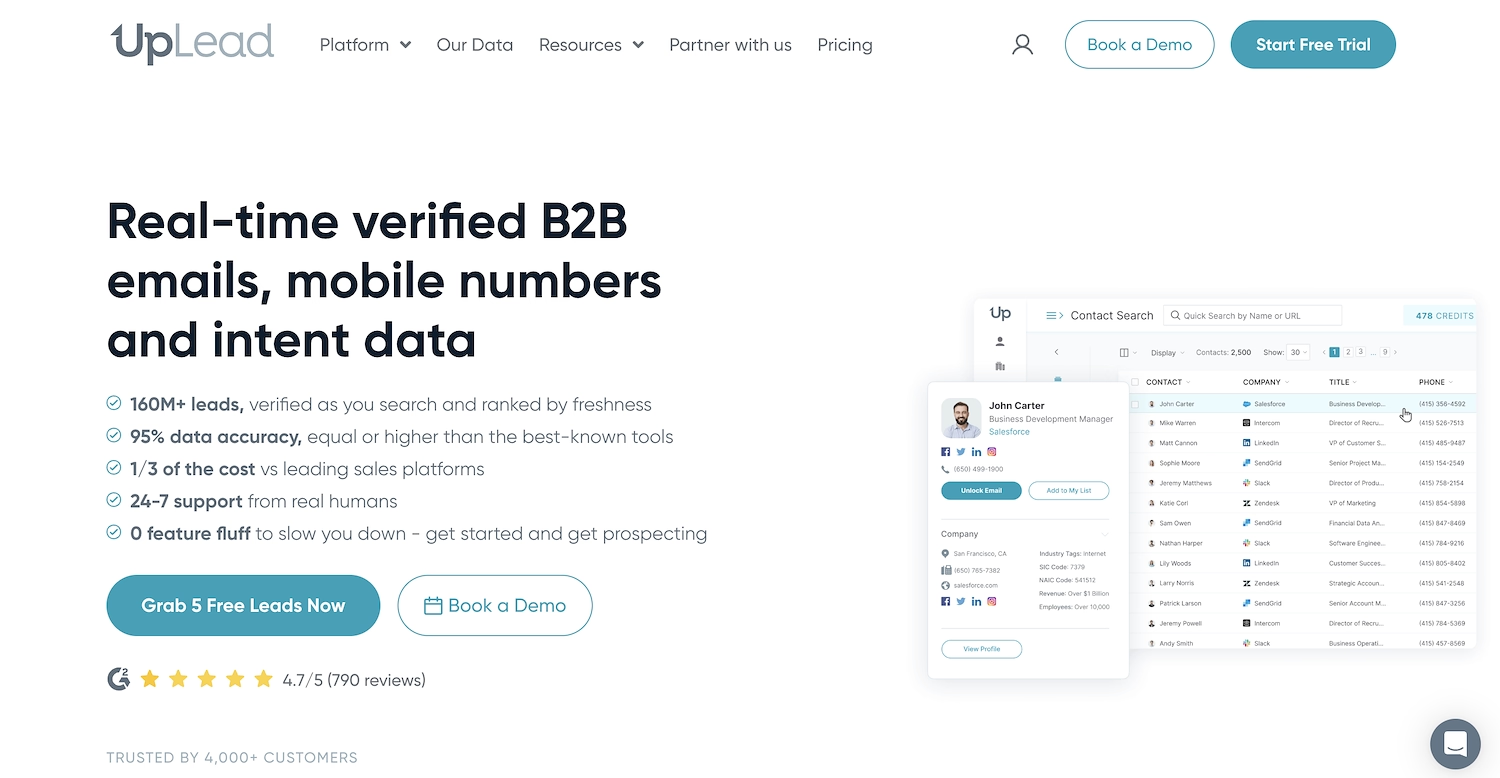
UpLead is a B2B data platform that provides contact and company profiles. Sales teams use it to find email addresses and direct dials for their prospect lists. The service offers business data to help users identify potential customers and support outreach efforts.
UpLead's Main Features
- Offers real-time email verification on every export, backed by a 95% accuracy guarantee.
- Surfaces prospects actively researching solutions with buyer intent data.
- Tracks over 16,000 technology installs per company to identify tech stacks.
- Provides a prospector tool with more than 50 search filters to build targeted lists.
How UpLead Compares To RocketReach
Average Review score: 4.7/5 stars based on 797 G2 reviews.
- UpLead provides real-time email verification with a 95% accuracy guarantee. This differs from RocketReach, where users sometimes find outdated contact information.
- It identifies prospects with active buyer intent signals. This offers a proactive element not central to RocketReach's contact lookup function.
- The platform tracks the technology stacks of companies. This allows for more targeted prospecting than the general search filters in RocketReach.
- Its direct integrations with major CRMs support automated workflows. This provides a more seamless data flow compared to RocketReach's data export options.
Where UpLead May Not Be The Best Fit
- UpLead's database, while large, sometimes has fewer contacts in certain niche industries compared to RocketReach. Teams that require a very high volume of leads may find RocketReach offers a broader pool of potential contacts.
- Its subscription plans are structured in monthly tiers. This model can be less flexible than RocketReach's credit-based system for teams that need to perform occasional, large-scale data lookups.
- The platform includes advanced features like buyer intent data. For teams that only need a simple tool for contact lookups, RocketReach's more focused interface might provide a more direct user experience.
Pricing and Cost-Effectiveness
UpLead offers transparent monthly pricing, with paid plans starting at $99. This tiered model provides predictable costs, differing from RocketReach's credit-based system, which is better suited for high-volume, sporadic lookups. For the most current pricing, visit UpLead's official website.
7) Snov.io
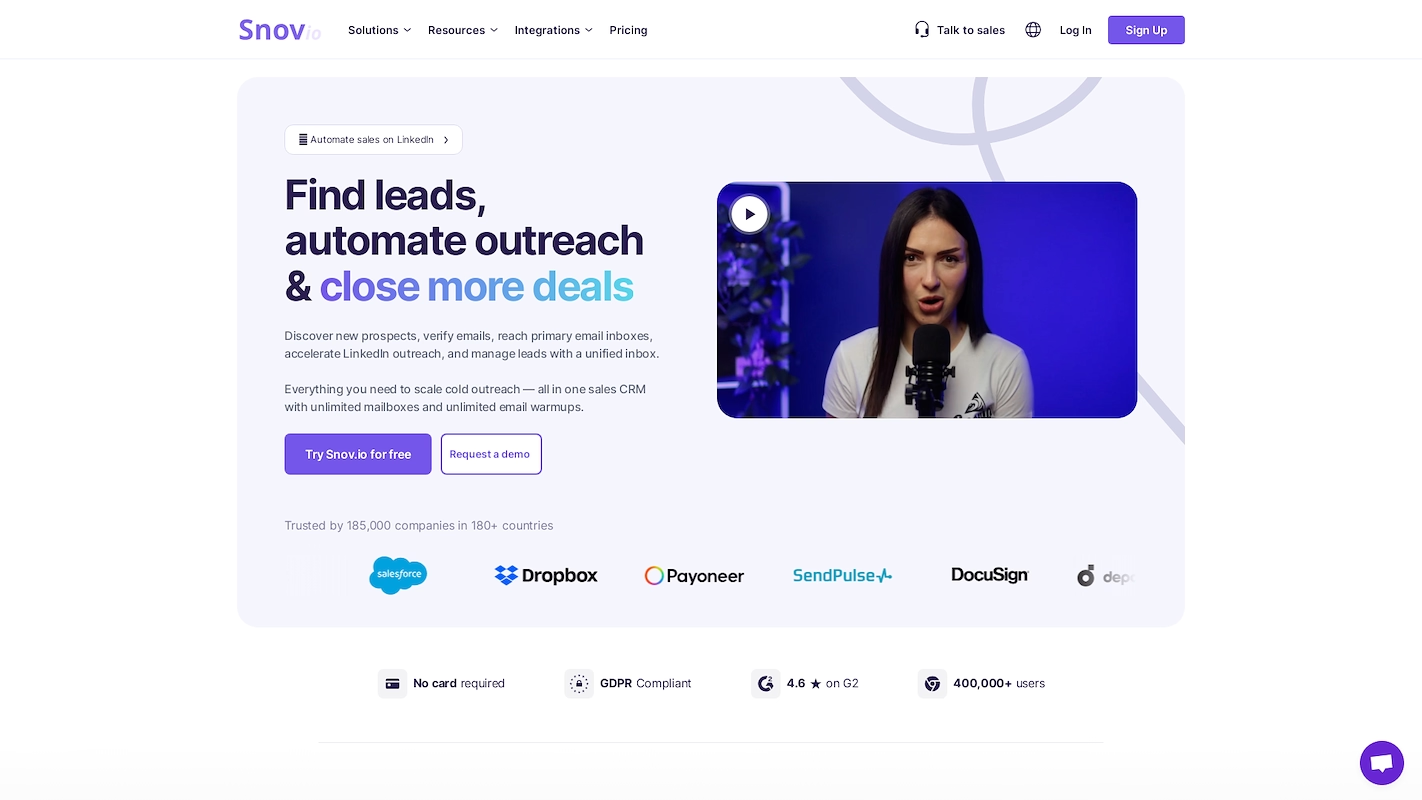
Snov.io is a sales automation platform that offers tools for lead generation and email outreach. Teams use the service to find contacts, verify email addresses, and run cold email campaigns. The platform combines several functions to support sales and marketing workflows from a single dashboard.
Snov.io's Main Features
- Offers a built-in sales CRM with Google Calendar sync and automated deal stages.
- Provides a deliverability toolkit that includes automated email warm-up and inbox placement checkers.
- Includes a LinkedIn automation tool for auto-actions and large-scale personalization in a safe cloud mode.
- Contains a unified inbox, Unibox, with reply-sentiment analysis.
How Snov.io Compares To RocketReach
Average Review score: 4.6/5 stars based on 450 G2 reviews.
- Snov.io includes a native sales CRM to manage deals and pipelines. This is different from RocketReach, which focuses on providing contact data and requires a separate CRM for deal management.
- It offers an email warm-up tool to improve deliverability. This feature helps protect sender reputation, a function not available in RocketReach, which centers on contact discovery.
- The platform provides LinkedIn automation to personalize outreach at scale. This is a sales engagement feature, whereas RocketReach's main purpose is to find contact information.
- Snov.io's unified inbox analyzes reply sentiment to help prioritize responses. This is a more advanced communication tool compared to RocketReach, which does not offer inbox management features.
Where Snov.io May Not Be The Best Fit
- Snov.io's database can sometimes have fewer contacts in niche industries. In comparison, RocketReach's larger database might provide more options for very specific searches.
- The tool focuses heavily on email addresses. For teams that need direct-dial phone numbers for cold calling, RocketReach often provides a more extensive list of phone contacts.
- It is an all-in-one platform with many features. For teams that only need to find contact data quickly, RocketReach offers a more direct and simpler user experience.
Pricing and Cost-Effectiveness
Snov.io offers transparent monthly pricing, with paid plans starting at $39. This model provides predictable costs, differing from RocketReach's credit-based system, which is better suited for high-volume, sporadic lookups. For the most current pricing, visit Snov.io's official website.
8) Seamless.AI
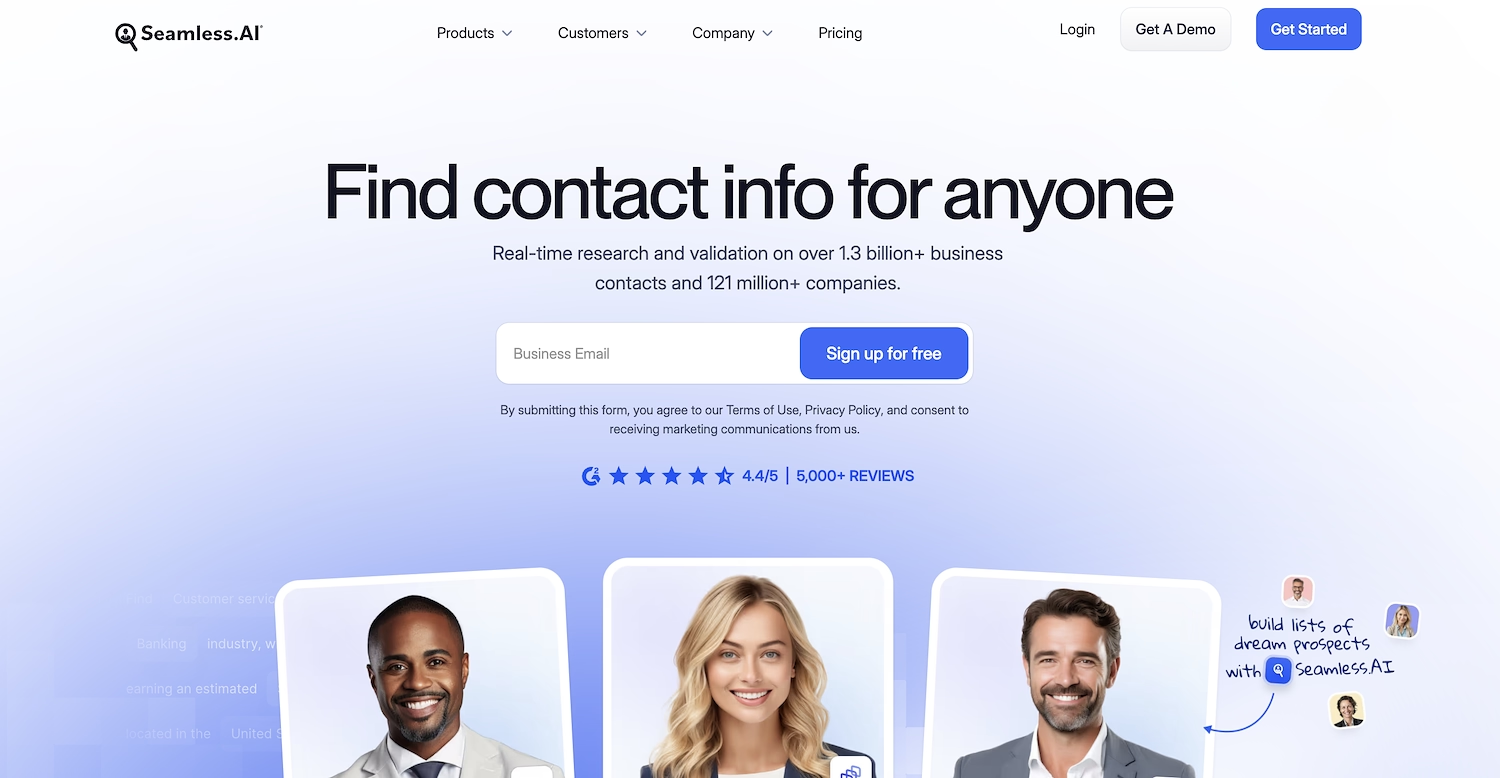
Seamless.AI is a sales intelligence platform. It provides B2B contact and company data to help teams find customers. Users can build prospect lists with verified emails and direct-dial phone numbers. The platform supports sales and marketing with data for outreach campaigns.
Seamless.AI's Main Features
- Uses a real-time search engine to access a database of over 1.7 billion contacts.
- Provides buyer intent data, job change alerts, and AI-powered data enrichment.
- Integrates with CRMs and sales platforms like Salesforce, HubSpot, and Salesloft.
- Offers data cleaning and lead validation to improve contact and company data accuracy.
How Seamless.AI Compares To RocketReach
Average Review score: 4.4/5 stars based on 5,067 G2 reviews.
- Seamless.AI operates as a real-time search engine to find current contact data. This approach differs from RocketReach, which pulls from a database where information may not always be up-to-date.
- The platform offers buyer intent data and tracks recent job changes. This gives sales teams timely signals for outreach, a more proactive feature compared to RocketReach's manual search function.
- It includes AI-powered data enrichment to automatically clean and complete your existing records. This contrasts with RocketReach, where the main function is to build and export new lists of contacts.
- Its direct integrations with platforms like Salesforce and HubSpot create a more connected workflow. This is different from RocketReach, where users often need to export data to use it in other systems.
Where Seamless.AI May Not Be The Best Fit
- Some users report that its data for certain regions is less comprehensive. In comparison, RocketReach's database might offer more contacts for teams that need to operate on a global scale.
- Its credit system can feel restrictive for teams with high-volume needs. RocketReach's plans, in contrast, are often better suited for users who need to perform large, occasional data pulls.
- The platform includes many features like buyer intent, which can create a learning curve. For teams that only need a simple contact lookup tool, RocketReach offers a more straightforward user experience.
Pricing and Cost-Effectiveness
Seamless.AI operates on a credit-based system, which some users find restrictive for high-volume needs. This differs from RocketReach's model, which is often better suited for large, sporadic data pulls. For the most accurate pricing, visit Seamless.AI's official website.
9) Lead411
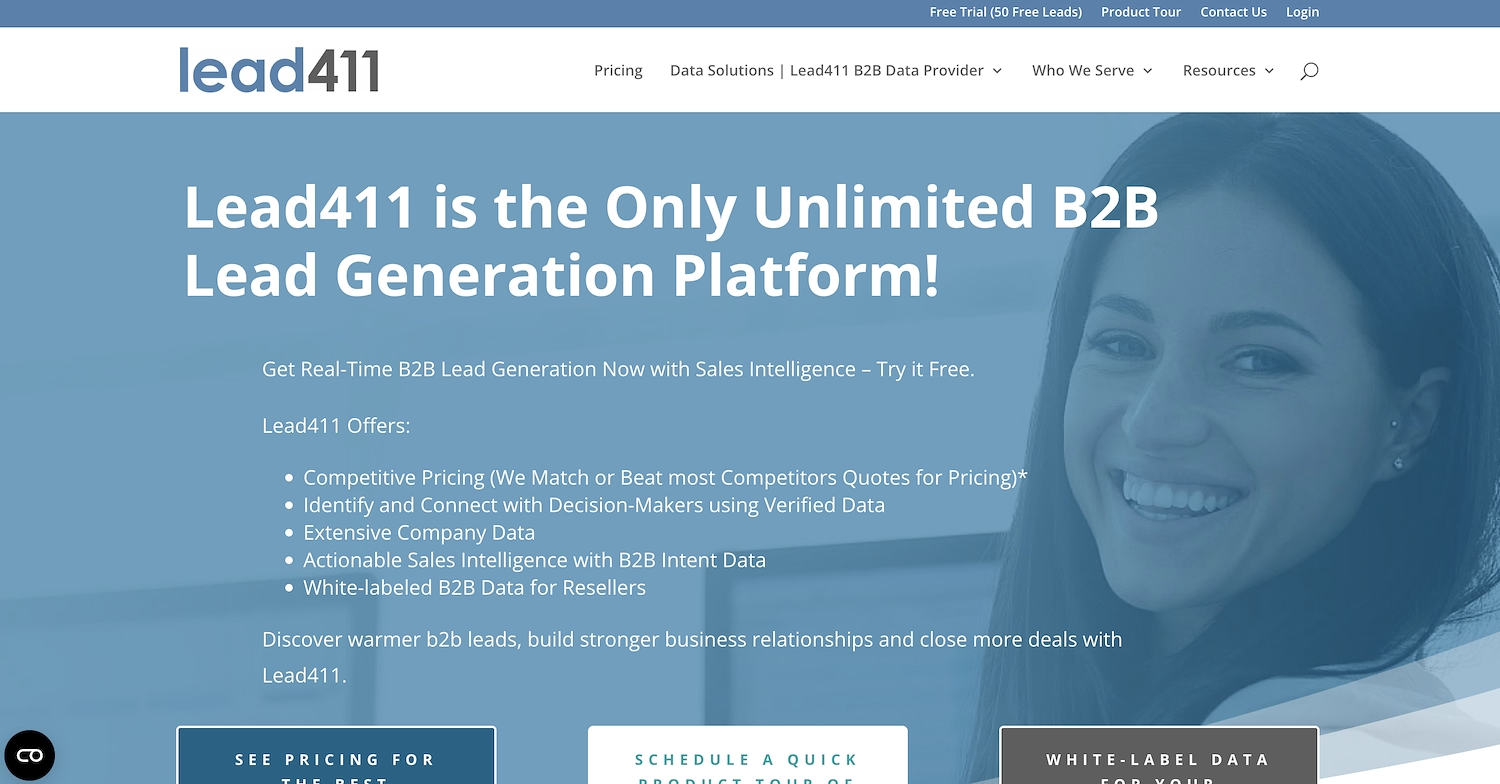
Lead411 is a B2B data provider that offers sales intelligence. Teams use the platform to access contact and company information for their go-to-market strategy. It helps users find prospects, build lists for outreach, and obtain verified data like email addresses and direct phone numbers.
Lead411's Main Features
- Provides growth intent data that signals when companies are in a buying cycle, such as recent funding or hiring plans.
- Offers buyer intent data powered by Bombora to identify companies actively researching specific topics.
- Includes a built-in email automation feature, Reach, for creating and managing outreach campaigns directly within the platform.
- Features an AI dashboard that automatically tracks key indicators for important leads.
How Lead411 Compares To RocketReach
Average Review score: 4.5/5 stars based on 466 G2 reviews.
- Lead411 provides growth intent data, like recent funding or hiring plans, which signals when a company enters a buying cycle. This offers a more proactive way to find leads than RocketReach's manual search function.
- It offers buyer intent data from Bombora to identify companies that actively research specific topics. This is different from RocketReach, which does not provide insight into a prospect's current research activity.
- The platform's built-in email automation feature, Reach, allows users to manage outreach campaigns directly. This contrasts with RocketReach, which requires data export to a separate tool for outreach.
- An AI dashboard automatically tracks key indicators for important leads. This provides a layer of lead management not found in RocketReach, which centers on contact data retrieval.
Where Lead411 May Not Be The Best Fit
- Some users find Lead411 has fewer contacts in niche industries. RocketReach's larger database, in comparison, may offer more results for teams that need to find very specific professional roles.
- The tool's broad feature set can create a learning curve for new users. In contrast, RocketReach provides a simpler interface for teams that only need quick contact lookups.
- Lead411's subscription plans are based on annual contracts. This model can be less flexible than RocketReach's credit-based system, which better suits teams that perform occasional, large-scale data searches.
Pricing and Cost-Effectiveness
Lead411 offers a Basic Annual plan at $75 per user per month, providing predictable costs for consistent use. This subscription model contrasts with RocketReach's credit-based system, which is better suited for occasional, high-volume data searches. For the most current pricing, visit Lead411's official website.
10) Cognism
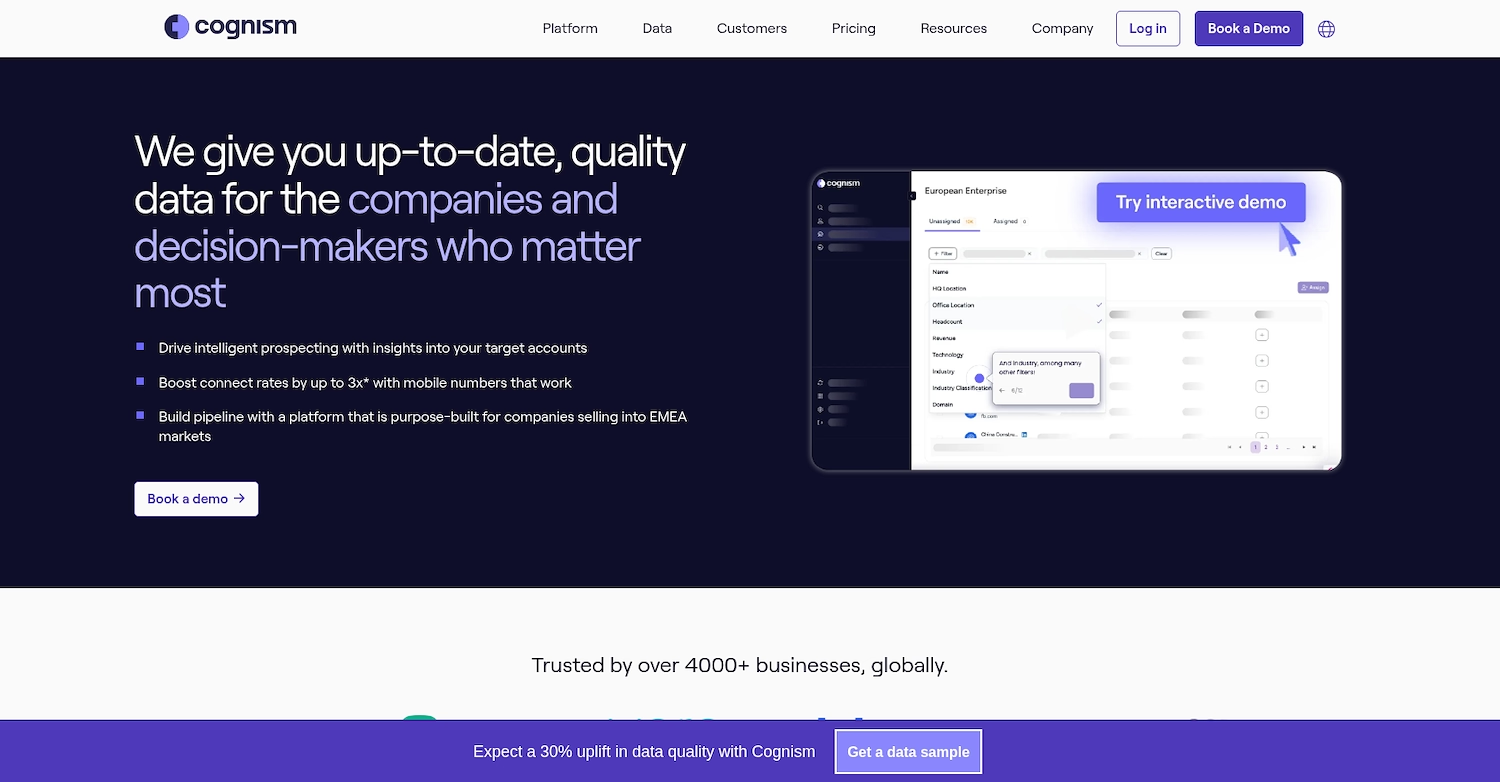
Cognism is a sales intelligence platform that provides B2B contact and company data. Teams use it to find verified email addresses and mobile numbers to connect with prospects. The service emphasizes data compliance, which supports international outreach and helps users build targeted lead lists.
Cognism's Main Features
- Offers integration with CRM and marketing automation platforms.
- Provides data cleaning and enrichment to improve existing records.
- Includes lead validation to verify the quality of contact data.
- Supplies industry research data to provide market context.
How Cognism Compares To RocketReach
Average Review score: 4.6/5 stars based on 1,033 G2 reviews.
- Cognism provides GDPR-compliant data with a strong focus on European markets. This differs from RocketReach's more general global database.
- It emphasizes data accuracy, particularly for direct-dial phone numbers in Europe. This offers a level of verification that can be more consistent than RocketReach's data.
- The tool's integrations with CRMs like Salesforce support automated workflows. This is a more direct connection compared to RocketReach, which typically relies on data exports.
- Its platform includes intent data to find companies actively looking for solutions. This offers a proactive feature, while RocketReach focuses on manual contact searches.
Where Cognism May Not Be The Best Fit
- Cognism's data is highly focused on European markets. For teams that need contacts in other global regions, RocketReach's broader database might provide a greater volume of leads.
- Its pricing is based on annual packages. This model can be less flexible for teams that only need occasional, high-volume data searches, where RocketReach's credit-based system is often more suitable.
- The platform includes advanced features that can create a learning curve. For teams that just need a simple tool for quick contact lookups, RocketReach offers a more straightforward experience.
Pricing and Cost-Effectiveness
Cognism offers custom annual packages, which differs from RocketReach's credit-based system for lookups. For the most accurate pricing information, we recommend visiting Cognism's official website.
Which One Should You Go With?
Choosing the right RocketReach alternative depends on your team's specific needs, budget, and workflow. This guide reviewed the top options to help you compare features and make an informed decision.
If your goal is to scale sales without adding headcount, consider 11x. Our digital workers handle prospect research and outreach, which frees up your sales team to focus on closing deals.




